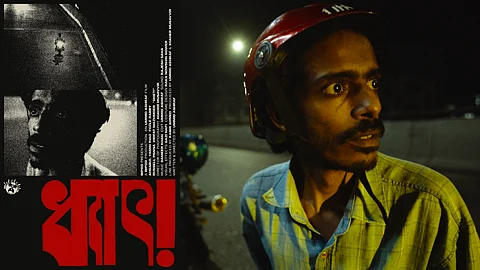
- HOMEGROWN WORLD
- #HGCREATORS
- #HGEXPLORE
- #HGVOICES
- #HGSHOP
- CAREERS
- ABOUT US
- CONTACT US

Strange things happen at night. The city, stripped of its daytime noise and chaos, comes alive in a different way. Everything feels heightened —more intimate, more charged, including our own minds that conjure up those provocative 3 AM thoughts. It is this electric late-night liminality, where reality, as we know it, starts to fray at the edges that DHET!, a surreal short film by Dhaka-based filmmaker Ummid Ashraf, leans into.
The short film begins with a ride-sharing motorcyclist in Dhaka who heads off to pick up his next passenger. But the night takes an unexpected, turn when somewhere along the way, he finds himself trapped on a bridge; looping endlessly, unable to exit, and caught in a recursive, haunting circuit.
DHET! manages to disorient and enchant you in a way that you wouldn't expect, especially from a short clocking in at just nine minutes of run-time. With a fairly simple premise, It drops you into a fertile playground of abstraction and dares you to keep up. The film’s refusal to spoon-feed the viewer any interpretation is what makes it such a potent work. Its obscure framework make you project your own psyche onto its contours.
Subliminally, DHET! Speaks to being stuck. The bridge becomes a metaphor for those moments in life when you’re trying to move forward but the road keeps folding in on itself. Be it the inertia of everyday life, an emotional rut, or societal structures that trap us. The film’s claustrophobic premise and minimal character setup heighten the allegorical weight of the narrative.
The filmmaker, Ummid Ashraf, delivers this eerie tale with remarkable perception and clarity for a debut filmmaker. A multidisciplinary artist from Dhaka, Ummid began his artistic journey through music and designing the album art led him to photography. “Now, photography is a way for me to understand what I’m going through, it is a coping mechanism, it is what I love doing in general,” he shares. This instinct to document the emotional undercurrents of his world is what lends DHET! its heart too.
Ummid trained in law but pivoted to the arts, eventually working as a colourist in the Bangladeshi post-production industry. Frustrated by late payments and a lack of recognition, he found himself wandering the streets of Dhaka at night, camera in hand. Under the very bridge that appears in DHET!, he captured the city’s strange nocturnal poetry. "There’s something so eerie and beautiful about Dhaka, one of the busiest cities, simmering down and becoming calm at night. All that led to DHET!’s first draft", he shares. Realising that the film has potential and making it was a process he describes as “part miracle, part a collective belief.”
The short is visually sculpted by cinematographer Xoaher Musavvir Jyoti. Trained in Prague and currently working between Bangladesh, India, and Europe, Xoaher’s camera acts as a conduit between the seen and the sensed. His work in DHET! strikes that sweet spot between the very familiar emptiness of the urban late night and the fantastical realm we're taken into through the rider.
While the film wears its abstractions boldly, its emotional core is deeply personal. For Ummid, it is both a protest and a tribute. “We made a film about being fed up with the old ways,” he writes in his director’s statement. “DHET! is a love letter to the people who lift you up, and a critique of the relics — the ones who are stuck in patterns of the past: abuse of power and suppression.”
It’s a film born of frustration, transformed into something strange and liberating. Our innately human need to make sense of the world might have you grasping for a resolution but in this case that becomes obsolete. In a loop with no clear exit, the real movement is internal. We don't know what happens to the rider. All we know is how he feels — DHET!: a guttural expression of annoyance or contempt.
Follow Ummid here and watch a teaser of the short film below:
If you enjoyed reading this here's more from Homegrown:
Renuka Shahane's 'Loop Line' Depicts The Unbreakable Cycle Of Domestic Subjugation
KISS: Varun Grover’s Surreal Short Film Takes On Art, Control & Censorship in India
Ghost Of The Mountain' Is An Indian Cinematic Ode To The World's Most Elusive Animal
